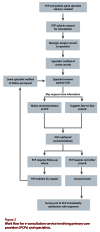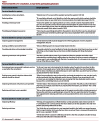Building access to specialist care through e-consultation
- PMID: 23687533
- PMCID: PMC3654501
Building access to specialist care through e-consultation
Abstract
Background: Limited access to specialist care remains a major barrier to health care in Canada, affecting patients and primary care providers alike, in terms of both long wait times and inequitable availability. We developed an electronic consultation system, based on a secure web-based tool, as an alternative to face-to-face consultations, and ran a pilot study to evaluate its effectiveness and acceptability to practitioners.
Methods: In a pilot program conducted over 15 months starting in January 2010, the e-consultation system was tested with primary care providers and specialists in a large health region in Eastern Ontario, Canada. We collected utilization data from the electronic system itself (including quantitative data from satisfaction surveys) and qualitative information from focus groups and interviews with providers.
Results: Of 18 primary care providers in the pilot program, 13 participated in focus groups and 9 were interviewed; in addition, 10 of the 11 specialists in the program were interviewed. Results of our evaluation showed good uptake, high levels of satisfaction, improvement in the integration of referrals and consultations, and avoidance of unnecessary specialist visits. A total of 77 e-consultation requests were processed from 1 Jan. 2010 to 1 Apr. 2011. Less than 10% of the referrals required face-to-face follow-up. The most frequently noted benefits for patients (as perceived by providers) included improved access to specialist care and reduced wait times. Primary care providers valued the ability to assist with patient assessment and management by having access to a rapid response to clinical questions, clarifying the need for diagnostic tests or treatments, and confirming the need for a formal consultation. Specialists enjoyed the improved interaction with primary care providers, as well as having some control in the decision on which patients should be referred.
Interpretation: This low-cost referral system has potential for broader implementation, once payment models for physicians are adapted to cover e-consultation.
Conflict of interest statement
Competing interests: None declared.
Figures



References
-
- Manuel D G, Maaten S, Thiruchelvam D, Jaakkimainen L, Upshur R. Primary care in the health care system. In: Jaakkimainen L, Upshur R, Klein-Geltink J, Leong A, Maaten S, Schultz S, Wang L, editors. Primary care in Ontario: ICES atlas. Toronto (ON): Institute for Clinical Evaluative Sciences; 2006. pp. 1–14. http://www.ices.on.ca/file/PC_atlas_prelims_complete.pdf.
-
- Berthelot J M, Sanmartin C. Access to health care services in Canada, January to December 2005. Ottawa (ON): Statistics Canada; 2006. Report No.: 82-575-XIE.
-
- Barua B, Rovere M, Skinner B J. Waiting your turn: wait times for health care in Canada. 2010 report. 20th ed. Calgary (AB): Fraser Institute; 2010.
-
- Tu J V, Pinfold S P, McColgan P, Laupacis A. Access to health services in Ontario. Toronto (ON): Institute for Clinical Evaluative Sciences; 2006.
-
- Chan Benjamin T B. The declining comprehensiveness of primary care. CMAJ. 2002 Feb 19;166(4):429–434. http://pubmedcentralcanada.ca/pmcc/articles/pmid/11876170. - PMC - PubMed
Publication types
MeSH terms
LinkOut - more resources
Full Text Sources
Medical
Miscellaneous
